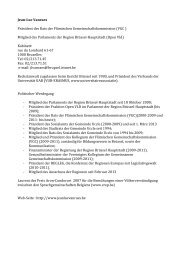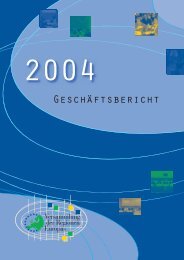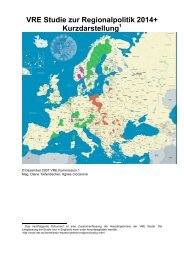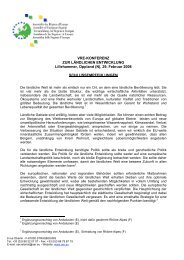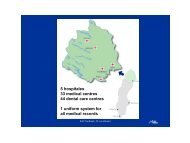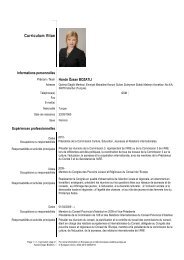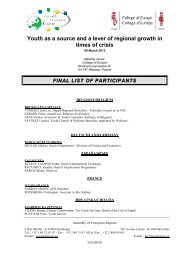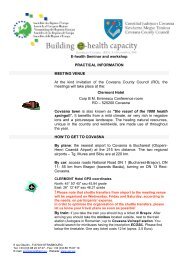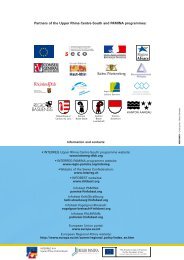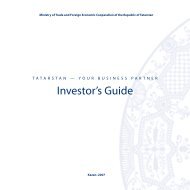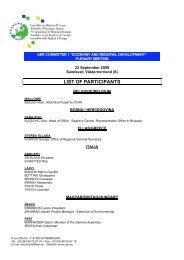art gold lebanon programme - Assembly of European Regions
art gold lebanon programme - Assembly of European Regions
art gold lebanon programme - Assembly of European Regions
You also want an ePaper? Increase the reach of your titles
YUMPU automatically turns print PDFs into web optimized ePapers that Google loves.
PRESENTATION<br />
ART GOLD LEBANON PROGRAMME<br />
A Methodology for Social Dialogue and Sustainable Development<br />
Over 80% <strong>of</strong> the Lebanese population currently<br />
lives in urbanized areas <strong>of</strong> the country, out <strong>of</strong> its<br />
estimated population <strong>of</strong> four million people.<br />
Lebanon enjoys a diverse and multi cultural<br />
society; but is a country characterized by<br />
marginalization <strong>of</strong> its peripheral areas, mainly<br />
Akkar in the North, Bekaa in the East, and South<br />
Lebanon. The South Lebanon marginalization<br />
was <strong>of</strong>ten exacerbated by the long-lasting<br />
occupations and wars.<br />
UNDP ART GOLD Lebanon is being implemented<br />
in the four neediest areas where the scores <strong>of</strong><br />
poverty rates mount high, the socio-economic<br />
problems are enormous, and the convergence<br />
between deprivation and the effects <strong>of</strong> the July<br />
2006 war took place. The ART GOLD Lebanon<br />
main aim however is to support the Lebanese<br />
national government and local communities in achieving the UN Millennium Development Goals (MDGs).<br />
UNDP ARTGOLD Lebanon utilizes the Local Development methodology. The methodology relies upon<br />
the territorial networks and p<strong>art</strong>nerships, which are extremely poor in the Lebanese target areas. To this<br />
end, the first steps <strong>of</strong> the program aimed at building-up and strengthening the Relational and Social<br />
Capitals <strong>of</strong> the target territories. The <strong>programme</strong> established 297 Municipal and 4 Regional Working<br />
Groups (RWGs) in its four target areas. The Working Groups gather the main local development<br />
stakeholders, representatives <strong>of</strong> the public administrations, civil society, business sector, decentralized<br />
and international cooperation, with the technical assistance <strong>of</strong> UNDP ARTGOLD Lebanon. The Municipal<br />
Working Groups identified their priority sectors and projects. A number <strong>of</strong> them were implemented and<br />
finalized. Based on the priorities identified at municipal level, the Regional Working Groups set-up 22<br />
Regional Thematic Working Groups that identified and agreed upon strategic regional projects. At the<br />
same time, a regional planning exercise in selected sectors st<strong>art</strong>ed-up. The Regional Working Groups<br />
requested training about p<strong>art</strong>icipatory Strategic Planning, and UNDP ARTGOLD Lebanon will provide it<br />
within the forthcoming months. Governance, Local Economic Development, Social Welfare, Health,<br />
Environment, Gender Equity and Education are the UNDP ART GOLD main fields <strong>of</strong> interventions at local<br />
and national levels. To support the Regional Working Groups efforts, UNDP ARTGOLD Lebanon<br />
facilitated the set-up <strong>of</strong> a number <strong>of</strong> decentralized cooperation p<strong>art</strong>nerships between Lebanese and<br />
<strong>European</strong> communities.<br />
UNDP ARTGOLD national counterp<strong>art</strong> is the Council for Development and Reconstruction (CDR). The<br />
implementation <strong>of</strong> ARTGOLD activities is also jointly liaised and closely coordinated with the national<br />
government through the National Committee that has been established by a Prime Minister decree on<br />
December 2007.<br />
1
SYNTHETIC INFORMATION<br />
Duration<br />
3 years<br />
Operation and<br />
National Institution: The Council for Development and Reconstruction<br />
coordination<br />
(CDR)<br />
structures Ministère at the<br />
national level The National Committee<br />
The National Committee (NC) is chaired by CDR President and include CDR<br />
Director <strong>of</strong> Planning and Programming, representatives from the Ministry <strong>of</strong><br />
Social Affairs, the Ministry <strong>of</strong> Interior & Municipalities and the Ministry <strong>of</strong><br />
Economy & Trade, in addition to UNDP Country Director, UNDP Portfolio<br />
Manager, ART GOLD Chief Technical Advisor (CTA), and representatives <strong>of</strong><br />
donors countries.<br />
Operational and<br />
coordination<br />
structures at the<br />
local level<br />
The National Committee (NC) was instituted by a decree <strong>of</strong> the Prime Minister<br />
issued end <strong>of</strong> October 2007 and its first meeting was held on 7 December<br />
2007 at the premises <strong>of</strong> the Council for Development and Reconstruction. The<br />
NC guarantees that all the UNDP ARTGOLD Lebanon initiatives are carried<br />
out in accordance with the Government policies and strategies to promote<br />
local governance and sustainable development. The NC also supports the<br />
Working Groups, promotes initiatives at national level for local development<br />
and liaises with the international p<strong>art</strong>ners, through the ART International<br />
Networks.<br />
The Chief Technical Advisor is in charge, in coordination with the National<br />
Committee, <strong>of</strong> the operational management <strong>of</strong> the <strong>programme</strong> at the central<br />
level and on a day-to-day basis. He also assumes the role <strong>of</strong> Executive<br />
Secretary to the National Committee<br />
The Area Managers are the responsible <strong>of</strong> the four ARTGOLD Lebanon area<br />
<strong>of</strong>fices. Under the overall guidance <strong>of</strong> the CTA, the AMs are responsible for<br />
the provision <strong>of</strong> technical, coordination and managerial support to all the<br />
activities <strong>of</strong> the <strong>programme</strong> at the local level.<br />
Working Groups are the basic tool for promoting social dialogue and buildingup<br />
the Relational Capital <strong>of</strong> the target areas and are chaired by the local<br />
authorities. As instruments <strong>of</strong> the territorial networking, they adopt<br />
p<strong>art</strong>icipatory methodologies and facilitate the inclusion <strong>of</strong> the most<br />
disadvantaged people. The 4 Regional (RWGs) appointed 22 Thematic<br />
Working Groups (TWGs), according to the priority <strong>of</strong> their territories. The WGs<br />
have played a crucial role in mitigating the fragmentation <strong>of</strong> the national and<br />
international initiatives and attracted additional resources towards ARTGOLD<br />
Lebanon target areas. UNDP ARTGOLD Lebanon organized also 22 Focus<br />
Groups, composed <strong>of</strong> representatives <strong>of</strong> groups <strong>of</strong> interest, aimed at detecting<br />
and defining shared problems and solutions.<br />
UNDP ARTGOLD is supporting the set-up <strong>of</strong> 4 Regional Economic<br />
Development Agencies, which will facilitate the creation <strong>of</strong> small-medium<br />
enterprises, mainly for the most vulnerable people. The Agencies are the<br />
economic specialized tools <strong>of</strong> the territorial p<strong>art</strong>nership.<br />
Working Groups South Lebanon: 170 Municipal Working Groups; 1<br />
Regional Working Group; 7 Thematic Working groups: Environment,<br />
Education, Social, Youth, Health, Tourism and Economy<br />
2
Cooperation<br />
p<strong>art</strong>ners<br />
Funds<br />
Working Groups Bekaa: 55 Municipal Working Groups; 2 Regional Working<br />
Groups (1 in West Bekaa and 1 in Rachaya); 5 Thematic Working Groups on<br />
Education, Agriculture, Health, Environment and Economy<br />
Working Groups North Lebanon: 65 Local Working Groups across North<br />
Lebanon; 1 Regional Working Group; 6 Thematic Working Groups on<br />
Education, Health, Environment, Nahr El-Bared issue, Governance and<br />
Economy; 1 Municipal Working Group in Tripoli<br />
Working Groups Beirut Southern Suburbs: 7 Municipal Working Groups; 1<br />
Regional Working Groups; 7 Thematic Working Groups on Waste<br />
management, Potable Water, Education, Youth, Health, Social issue,<br />
Economy.<br />
UN Agencies<br />
UNOPS is managing the international technical assistance <strong>of</strong> the <strong>programme</strong><br />
Decentralized Cooperation p<strong>art</strong>ners<br />
South Lebanon: Coordination <strong>of</strong> the Italian Local Entities for Peace and<br />
Human Rights (around 40 local administrations, activated p<strong>art</strong>nerships with<br />
the Municipalities <strong>of</strong> Padova, Riccione and Turin, and the Province <strong>of</strong> Ferrara),<br />
Tuscany and, Catalonia <strong>Regions</strong>.<br />
Bekaa: “Les Amis du Liban”, a Principality <strong>of</strong> Monaco NGO, and the<br />
Catalonia, Marche and Puglia <strong>Regions</strong>.<br />
North Lebanon: IRIS-Pescara Province, Abruzzo, Umbria and Marche<br />
<strong>Regions</strong>, Naples, Cosenza and Foligno Provinces, ANAAO National<br />
Association;<br />
Beirut Southern Suburbs (BSS): Tuscany Region, Arezzo and Naples<br />
Province, Grosseto, Prato, Pontedera and Milan municipalities, ARET<br />
Abruzzo, ARCI/UISP Tuscany<br />
For 2007, 2008 and 2009, the UNDP RTGOLD Lebanon has a global budget<br />
<strong>of</strong> approx. US.$. 19 M<br />
Governments<br />
The Italian Government, has released its first allotment <strong>of</strong> 5,402,564 US$ for<br />
the year 2007, against a total pledge <strong>of</strong> 8,187,406 EURO for a three year<br />
period.<br />
The Belgian Government contribution amounts to US$3 M for a two year<br />
period in support <strong>of</strong> the Local Economic Development component in North<br />
Lebanon and Bekaa.<br />
The Spanish Government approved a contribution <strong>of</strong> US$ 2.2 M for 2007 and<br />
US.$. 2.2. M for 2008 in support <strong>of</strong> the four Lebanese regions targeted by<br />
ARTGOLD.<br />
The Monaco Principality Government approved a contribution <strong>of</strong> US.$.<br />
100.000 for Bekaa.<br />
The Canadian Government is considering a contribution <strong>of</strong> US.$.3 M for North<br />
Lebanon.<br />
International P<strong>art</strong>ners: UNDP ARTGOLD is co-financing projects, identified<br />
by the Local Working Groups, with the Italian Bilateral Cooperation in<br />
Lebanon, mainly in Beirut Southern Suburbs, Bekaa and South Lebanon.<br />
National P<strong>art</strong>ners: The Lebanese CDR has made a contribution <strong>of</strong> US$<br />
100.000 for supporting education projects identified by the North Lebanon<br />
Regional Working Group.<br />
3
RESULTS IN THE SOUTH LEBANON AREA<br />
South Lebanon has an area <strong>of</strong> 2022 Km 2 (including<br />
Chebaa farms). It encompasses two Governorates<br />
(Mohafazahs): South Lebanon (133 Municipalities) and<br />
Nabatiyeh (119 Municipalities), which are<br />
administratively divided into six Kadas (clusters <strong>of</strong><br />
villages)<br />
Realised Projects<br />
• Three pilot projects dealing with water<br />
management, energy saving and waste treatment<br />
have come into being in early 2008. Those<br />
projects are supported by six Italian Municipalities<br />
and Provinces working under the Italian Coordination <strong>of</strong> Local Authorities for Peace and Human<br />
Rights. In the same context, two other pilot projects, on youth and education are being jointly<br />
formulated.<br />
• The Catalonia region has channeled US$ 167.000 through ART GOLD Lebanon, utilized for the<br />
Restoration <strong>of</strong> a market livestock in support <strong>of</strong> the Federation <strong>of</strong> Cooperatives in Chamaa and 9<br />
neighboring villages.<br />
• Tuscany Region, ROSS program, Italian NGOs (UCODEP and ARCS) and ART GOLD finalized the<br />
formulation <strong>of</strong> a joint project for supporting milk and dairy production in the villages <strong>of</strong> Arabsaleem and<br />
Qana, and their surroundings in the districts <strong>of</strong> Tyre and Nabatiyeh. The project tackles two issues: (1)<br />
Awareness campaigns, and (2) Rehabilitation. ART GOLD is financing the awareness component that<br />
amounts to US.$. 71,900.00<br />
Ongoing Projects<br />
35 projects are being implemented in health, social, urban, education, environment and agriculture<br />
sectors.<br />
Health, Social and Urban:<br />
• Construction <strong>of</strong> a public park where p<strong>art</strong> <strong>of</strong> it will be used as a public market in Choaya<br />
• Establishment <strong>of</strong> a pavement with iron safety borders near the Red Cross in Hasbaya<br />
• Placement <strong>of</strong> florescent safety signs along the main roads in addition to safety borders and barriers in<br />
Adaisse<br />
• Reconstruction <strong>of</strong> pavements destroyed during the July 2006 war <strong>of</strong> 800m length and 1m width in<br />
Qsaibe.<br />
• Construction <strong>of</strong> a pavement <strong>of</strong> 1200m length on the village entrance <strong>of</strong> Beit Leif<br />
• Provision <strong>of</strong> the main road from Alhinniye to Zibkeen with Lighting<br />
Education<br />
• Establishment <strong>of</strong> a public library through the provision <strong>of</strong> internet access in addition to available<br />
resources including books and encyclopedias in Blida village<br />
• Establishment <strong>of</strong> a public library including all the necessary equipment in Braiqaa village<br />
• Reparation <strong>of</strong> an IT lab with a minimum <strong>of</strong> 12 PC's + generator + LCD in Beni Hayyane village<br />
• Procurement <strong>of</strong> a photocopier "Ricoh Digtal 2045" for the public school in Chaqra.<br />
Environment:<br />
• Procurement <strong>of</strong> garbage collection trucks in Rmeish, Yater, Teir Harfa and Deir Mimas<br />
• Construction <strong>of</strong> a sewage system network with length <strong>of</strong> 600M in Tibnine<br />
• Procurement <strong>of</strong> vehicles (pick up) + waste containers in Kfair Village<br />
• Procurement <strong>of</strong> a garbage collection truck in Kfar Hamam village<br />
• Procurement <strong>of</strong> a large truck street sweeper in Khiam village<br />
4
• Construction <strong>of</strong> storm water<br />
conduits <strong>of</strong> 1000m length in<br />
Qabrikha village<br />
• Procurement <strong>of</strong> a water<br />
tanker to transport water to<br />
the village in Dibbinne<br />
• Procurement <strong>of</strong> a pick up<br />
for waste collection in<br />
Houmine el Tahta village<br />
• Development <strong>of</strong> the spring<br />
to increase water flooding in<br />
Kfar Fila village<br />
• Procurement <strong>of</strong> a generator<br />
for the well <strong>of</strong> 250KVA in Sir<br />
el Gharbieh village<br />
• Provision the Ain Baal<br />
municipality with sewage<br />
pipes <strong>of</strong> length 1750m<br />
• Construction <strong>of</strong> storm water<br />
conduits <strong>of</strong> 1500 M length<br />
and covering it with cement<br />
in Hanawey village<br />
• Construction <strong>of</strong> a public<br />
park: planting <strong>of</strong> trees and<br />
flowers, Lighting, and<br />
children's playground<br />
equipment in Rmadieh<br />
village<br />
• Construction <strong>of</strong> storm water<br />
conduits <strong>of</strong> 800m length in<br />
Mazraat Meshref village<br />
• Construction <strong>of</strong> road side to<br />
enhance road safety and<br />
appearance in Jabal Al<br />
Rihan Union <strong>of</strong><br />
Municipalities<br />
• Water Management and<br />
Water Infrastructures<br />
Improvement in the Kadas<br />
<strong>of</strong> Nabatiyeh & Bint Jbei<br />
• Reducing Environmental<br />
Impact <strong>of</strong> Municipal Waste<br />
Disposal Sites in Taybe<br />
village<br />
• Increasing energy efficiency<br />
and the utilization <strong>of</strong> Renewable Energy Source in Tyre City<br />
Water Management and Water Infrastructures Improvement – A Pilot<br />
Water Management Project in Nabatiyeh and Bint Jbeil Cazas, South<br />
Lebanon<br />
The South Lebanon water situation is critical. The massive destruction <strong>of</strong><br />
infrastructure caused by the July 2006 war resulted in the majority <strong>of</strong> villages having<br />
access to water only twice a week. The project was proposed by the Italian<br />
Coordination and the Working Groups in February 2008, in collaboration with the<br />
Italian Cooperation in Lebanon. The project aims at improving the water<br />
management in Nabatiyeh and Bint Jbeil Cazas and targets around 40,000<br />
beneficiaries. Its main activities include:<br />
• Training <strong>of</strong> four local technicians and one engineer on pipe network<br />
maintenance and management in Turin-Italy and <strong>of</strong> additional ones in Tyre<br />
• Purchasing <strong>of</strong> equipment for the maintenance centers that will be created in<br />
the Municipalities <strong>of</strong> Nabatiye and Bint Jbeil.<br />
• Conducting awareness campaigns and community training on water saving and<br />
water scarcity reduction.<br />
Reducing Environmental Impact <strong>of</strong> Municipal Waste Disposal Sites - A<br />
Pilot Waste Management Project in Marjeyoun Caza, South Lebanon<br />
30,000 inhabitants <strong>of</strong> the South Lebanese area <strong>of</strong> Marjeyoun Caza will benefit from<br />
the project, which was proposed by the Italian Coordination and the Working Groups<br />
in February 2008, in collaboration with the Italian Cooperation in Lebanon. It aims at:<br />
• Promote the waste recycling and improve the collection system<br />
• Improving temporary storage sites and further enhancing <strong>of</strong> recycled-based<br />
items through volume reduction<br />
• Detecting urban hazardous waste and managing its protected storage<br />
• Training <strong>of</strong> one Lebanese technical expert <strong>of</strong> the Caza and one Lebanese<br />
Engineer for each municipality on waste management in Italy<br />
• Training <strong>of</strong> other Lebanese technical experts and engineers in Lebanon with the<br />
support <strong>of</strong> the trained expert and engineers mentioned above.<br />
Increasing energy efficiency and utilization <strong>of</strong> renewable energy<br />
sources – Tyre City<br />
It is a pilot project proposed by the Italian Coordination and the Tyre Working Group<br />
in February 2008, in collaboration with the Italian Cooperation in Lebanon. This<br />
project aims at increasing end-use efficiency and at developing the use <strong>of</strong> renewable<br />
energy sources in Tyre city.<br />
Five main activities are foreseen:<br />
• Water solar heating on Tyre’s public Hospital<br />
• Training on end-use efficiency.<br />
• Preliminary overview about electrical network analysis<br />
• Water pumping using photovoltaic technology that converts light directly into<br />
electricity.<br />
• Preliminary study about the generation <strong>of</strong> electrical energy through wind<br />
power.<br />
The solution <strong>of</strong> providing irrigation pumps with solar energy is p<strong>art</strong>icularly<br />
interesting for the South Lebanon area. The Italian Cooperation is considering the<br />
possibility <strong>of</strong> supporting the dissemination <strong>of</strong> such an innovation to other rural<br />
areas.<br />
Agriculture:<br />
• Distribution <strong>of</strong> 190 beehives for bee keeping farmers Maroun el Ras (each family will receive 5<br />
beehives)<br />
• Rehabilitation <strong>of</strong> natural spring and irrigation systems in Jarjoua village<br />
• Establishment <strong>of</strong> an irrigation dripping system in Jbaa village<br />
• Procurement <strong>of</strong> a tractor with all the supplies to give boost to farmers and the agriculture in Chehabieh<br />
• Construction <strong>of</strong> a second floor to the permanent public market in Deir Qanoun el Naher<br />
• Restoration <strong>of</strong> market livestock in Chamaa<br />
• Supporting milk and dairy production in Arabsaleem and Qana villages<br />
5
RESULTS IN THE BEKAA AREA<br />
The areas <strong>of</strong> ART GOLD operation in Bekaa include the Cazas <strong>of</strong> West Bekaa and Rachaya. West Bekaa<br />
is situated in the southwestern p<strong>art</strong> <strong>of</strong> the Bekaa Mohafaza. West Bekaa is separated from the coast by<br />
the western chain <strong>of</strong> mountain: Barouq Mountain (1940 m) and Niha Mountain (1700 m). West Bekaa is<br />
one <strong>of</strong> the five Cazas <strong>of</strong> the Governorate <strong>of</strong> Bekaa. It has an area <strong>of</strong> 465.25 Km 2 and a total population<br />
estimated at 54,252 persons. The area is constituted <strong>of</strong> 36 villages, <strong>of</strong> which 25 formed municipal<br />
councils, and is divided upon two federations: Al Sahl (12,500 Hec) 12 villages & Al Bouhaira (2,275 Hec)<br />
17 villages. The district has two main centers Jeb Jannine in winter and Saghbine in summer.<br />
Rashaya is situated in the southeastern p<strong>art</strong> <strong>of</strong> the Bekaa Mohafaza. Rachaya is also one <strong>of</strong> the five<br />
Cazas <strong>of</strong> Bekaa. It has an area <strong>of</strong> 541.06 Km 2 , and a total population estimated at 73,000 persons. The<br />
area is constituted <strong>of</strong> 28 villages, <strong>of</strong> which 26 formed municipal councils.<br />
Realised projects with Decentralized Cooperation<br />
P<strong>art</strong>nerships<br />
• The Catalonia region supports the establishment <strong>of</strong> a<br />
market for small and medium-sized livestock breeders<br />
and fruit and vegetable in Al Marj village and the<br />
Rehabilitation <strong>of</strong> Storm open drainage canals in Daher<br />
El Ahmar -Rashaya area and Lebaya – West Bekaa<br />
area, for a total amount <strong>of</strong> US$ 193.000<br />
• “Les Amis du Liban”, a Monaco Principality NGO, is<br />
supporting the procurement <strong>of</strong> medical equipment for<br />
the Primary Health Care Center in Houch Harimeh.<br />
Ongoing Projects<br />
33 projects are being implemented in agriculture,<br />
environment, economy, health and education sectors.<br />
Agriculture<br />
• Rehabilitation <strong>of</strong> Agricultural Roads in Mdkoukha,<br />
Baloul, Lala, Kawkaba, Deir El Ashayer, Ain Arab, Kfar<br />
Dinnes, Mhaydseh, Kfar Mishkek, Khirbet Rouha, and<br />
Al Rafeed villages<br />
• Rehabilitation <strong>of</strong> the Agricultural Road & Public<br />
Garden in Bakkifa villages<br />
Environment<br />
• Rehabilitation <strong>of</strong> Public Garden in Bakifa, Rehabilitation <strong>of</strong> Open Storm drainage canal in Daher El<br />
Ahmar and Lebaya villages<br />
• Rehabilitation <strong>of</strong> Pedestrian Bridge, and Fishery, in Qelya village<br />
• Procurement <strong>of</strong> Mowers in Ghazeh and Jeb Janine villages<br />
Economy<br />
• Rehabilitation <strong>of</strong> a River Side Restaurant and Youth Camp in Qelya village<br />
• Construction <strong>of</strong> a Public Market in Al Marj village<br />
Health<br />
• Construction <strong>of</strong> a Library & Dispensary in Al Saweiri village<br />
• Construction <strong>of</strong> a Primary Health Care Center and Procurement <strong>of</strong> Medical Equipment in Houch<br />
Harimeh village<br />
6<br />
Focus Group Meeting with LED International<br />
Expert in Bekaa (September 2007)<br />
Construction <strong>of</strong> Public Market in Al Marj, West<br />
Bekaa<br />
It is a 1,8oo m 2 livelihood project that generates<br />
direct income for livestock and vegetable sellers<br />
<strong>of</strong> Al Marj and neighboring villages, as well as for<br />
Al Marj Municipality. The number <strong>of</strong> beneficiaries<br />
is estimated at more than 20,000 persons.<br />
Funded by Catalan, the project is in collaboration<br />
with the local livestock traders, retailers and<br />
farmers.
• Rehabilitation <strong>of</strong> the Social & Educational Center in Al Birreh village<br />
Education<br />
• Rehabilitation <strong>of</strong> a Public Library in Rashaya Village<br />
• Rehabilitation <strong>of</strong> a Public School Metallic Ro<strong>of</strong> in Tanourah village<br />
• Rehabilitation a Football Playground in Daher El Ahmar village<br />
• Procurement <strong>of</strong> Outdoor Playground Equipment in Jeb Janine village<br />
• Establishment <strong>of</strong> an IT Center (Library Children Sctn) and Procurement <strong>of</strong> Outdoor Playground<br />
Equipment in Mansourah village<br />
• Establishment <strong>of</strong> an IT Center (8 PCs) in Qeraoun village<br />
• Construction <strong>of</strong> a Public School Playground Ceiling in Kamed El Louz<br />
• Construction <strong>of</strong> a Sports Playground in Aitanit village.<br />
RESULTS IN THE NORTH LEBANON AREA<br />
North Lebanon is the poorest area in Lebanon,<br />
with the lowest indicators for human<br />
development. North Lebanon includes three<br />
districts/Cazas: Akkar, Menieh-Al Dinnieh and<br />
Bab Al Tebani in Tripoli city. It comprises 251<br />
towns, <strong>of</strong> which 119 have municipalities.<br />
Since 20 May, North Lebanon suffered a serious<br />
security situation, due to the crisis <strong>of</strong> Nahr el<br />
Bared Palestinian refugee camp, situated 16 KM<br />
north <strong>of</strong> Tripoli near the coastal road. The three<br />
months crisis that ended on 4 Sept affected the<br />
progress <strong>of</strong> ART GOLD in North Lebanon.<br />
Realised projects with Decentralized<br />
Cooperation P<strong>art</strong>nerships<br />
The Abruzzo region supports a strategic planning<br />
project in North Lebanon, aimed at fostering<br />
social dialogue between local and <strong>European</strong><br />
communities. Umbria Region, FELCOS Umbria<br />
and Foligno Province support the local<br />
beekeepers. The Abruzzo and Marche <strong>Regions</strong><br />
support the creation <strong>of</strong> the protected area <strong>of</strong><br />
Akkar. Cosenza Province will support Primary<br />
Health Care activities. Campania Region and<br />
Napoli Province support projects for mitigating the<br />
school drop-out.<br />
Ongoing Projects<br />
11 projects are being implemented in agriculture,<br />
social services and education:<br />
Agriculture:<br />
• Rehabilitation <strong>of</strong> irrigation Canals in Kfar Habou village<br />
• Establishment <strong>of</strong> Agriculture Irrigation Canals in Ain Al-Ghaida village<br />
• Rehabilitation <strong>of</strong> Agricultural Roads in Ayn Al-Zayt village<br />
Working Group Meeting in North Lebanon, September<br />
2007<br />
7<br />
Management <strong>of</strong> the protected area <strong>of</strong> Jourds<br />
The green area <strong>of</strong> Jourds is the wider in Middle East region and<br />
encompasses 16 villages. The naturalistic Lebanese NGO<br />
MADA is developing an excellent work in the area, trying to<br />
involve the whole <strong>of</strong> the territorial stakeholders. UNDP<br />
ARTGOLD established a Thematic Working Group, aimed at<br />
establishing and managing a protected area. One <strong>of</strong> the main<br />
problems <strong>of</strong> the area was the 20 years conflict between the<br />
villages <strong>of</strong> Akkar Al Atika and Fnaydek. But, thanks to the correct<br />
approach adopted by MADA and the methodology proposed by<br />
ARTGOLD, the two mayors, Khaled Bahri and Samih Abdel<br />
Haythe, decided to work together for the mutual development,<br />
stopping the conflict. UNDP ARTGOLD is supporting the creation<br />
<strong>of</strong> the promoting committee <strong>of</strong> the protected area, which will<br />
gather the 16 mayors, while Abruzzo and Marche <strong>Regions</strong> will<br />
provide technical assistance for the elaboration <strong>of</strong> the strategic<br />
development plan <strong>of</strong> the area, linking the biodiversity protection<br />
to the economic development and to the urban planning <strong>of</strong> the<br />
16 villages. The project is supported by the Italian, Belgian,<br />
Spanish and Canadian governments.
Social Services:<br />
• Providing drinking water in Assoun village<br />
• Establishment <strong>of</strong> a Municipal Mini-Football Stadium in West Tel Abbas village<br />
• Procurement <strong>of</strong> an Electric Generator for Water Station in Mashta Hammoud village<br />
• Establishment <strong>of</strong> Mini-Football & Basketball Courts in Akkar Attika village<br />
Education:<br />
• Rehabilitation & Equipping <strong>of</strong> Information center in Beit Al-Fakes village<br />
• Establishment <strong>of</strong> a Municipal Center for Technology & Languages in Al-Hmaira village<br />
• Establishment <strong>of</strong> A Cultural Municipal Center in Khraibet Al-Jindi village<br />
• Establishment <strong>of</strong> an IT Center in Al-Karkaf village.<br />
RESULTS IN THE BEIRUTH SOUTHERN SUBURBS (BSS)<br />
Beirut Southern Suburbs is located south <strong>of</strong> Beirut and is p<strong>art</strong><br />
<strong>of</strong> the capital. It is administratively affiliated with the<br />
Governorate <strong>of</strong> Mount Lebanon. Beirut Southern Suburbs, also<br />
known as “Dahya”, includes eight Municipalities: Borj Al<br />
Barajneh, Haret Hreik, Ghobeiry, Chiah, Mrayjeh, Forn El<br />
Chebak, Hadath and Chouiefat.<br />
The population <strong>of</strong> “Dahya” grew sporadically especially during<br />
the Lebanese civil war, whereby forced migration from the<br />
area <strong>of</strong> Borj Hamoud in East Beirut took place. This went<br />
along with migrations from villages in south Lebanon and the<br />
Bekaa valley during Israel invasion to Lebanon in 1978. The<br />
result was an unchecked expansion that left a detrimental<br />
impact on the socio-economic conditions in the area, with an<br />
excessive rise to poverty. “Dahya” never really had the<br />
chance, since that time, to experience adequate planning to its<br />
physical infrastructure, but neither to its social and economic frameworks.<br />
Realised projects with Decentralized Cooperation P<strong>art</strong>nerships<br />
• The Tuscany region and ARCI support a project to help young people who risk social exclusion.<br />
• The Municipality <strong>of</strong> Milan support to a project for water treatment and social communication.<br />
• The province <strong>of</strong> Arezzo support to a pilot project for the reorganization <strong>of</strong> basic health services.<br />
• The Campania region and the province <strong>of</strong><br />
Napoli are formulating a pilot project for<br />
mitigating the school drop-out, in<br />
p<strong>art</strong>nership with Napoli “Chance” initiative.<br />
Ongoing Projects<br />
Social:<br />
• Enhance social workers and animators<br />
capacities to deal with youth and to<br />
develop a youth social plan in Chiah, Forn<br />
al Chebbak and Hadath municipalities.<br />
Health:<br />
• Enhance Primary Health Care System in<br />
Haret Hreik municipality.<br />
Me, my school and my neighborhoods - A Pilot<br />
Education Programme in Mreyjeh, BSS<br />
The ART GOLD education pilot <strong>programme</strong> in Mreyjeh municipality<br />
<strong>of</strong> Beirut Southern Suburbs is implemented in p<strong>art</strong>nership with<br />
Decentralized Cooperation and the Italian Bilateral Cooperation in<br />
Lebanon.<br />
The <strong>programme</strong> applies the Maps <strong>of</strong> Needs and Resources in<br />
Schools and Neighborhoods, a p<strong>art</strong>icipatory methodology that a<br />
school team <strong>of</strong> directors, teachers and students use together with<br />
the local community to agree upon a shared analysis <strong>of</strong> their needs,<br />
problems and resources. It is a simple and practical method,<br />
already successfully implemented in Latin America, Africa and<br />
Bosnia, mainly to promote the p<strong>art</strong>icipation <strong>of</strong> the scholastic<br />
community in the development process.<br />
The Maps is an exercise where teachers, students and parents play<br />
an active role in their community development with the objective to<br />
raise awareness and promote community p<strong>art</strong>icipation. Most<br />
significantly, the Maps utilize the students as social promoters<br />
within their community. In addition to the scholastic community,<br />
local authorities and institutions play a fundamental role in the<br />
creation <strong>of</strong> the non-conventional maps.<br />
8<br />
The Socio-Academic Intervention in<br />
Schools - A Pilot Education<br />
Programme in Mreyjeh municipality<br />
The Socio-Academic Intervention in<br />
Schools is an extracurricular pilot project<br />
launched in Beirut Southern Suburbs that<br />
will be replicated in other areas, including<br />
North Lebanon among others. The pilot<br />
project attempts to strengthen the<br />
utilization <strong>of</strong> active teaching methods that<br />
provide psycho-social and academic<br />
support for students with educational<br />
problems. This objective is achieved<br />
through building the capacity and skills <strong>of</strong><br />
teachers by utilizing active teaching<br />
methods.<br />
ART GOLD is implementing this methodology, through the<br />
Lebanese NGO Al-Kajal, in four Intermediate schools in Mreyjeh in<br />
Beirut Southern Suburbs targeting around 500 students and<br />
involving 32 teachers and four facilitators. The methodology is<br />
being implemented also in other Lebanese areas.
Education:<br />
• The Scholastic Maps <strong>of</strong> Needs and Resources in Schools and Neighborhoods - A Pilot Education<br />
Programme in Mreyjeh, municipality<br />
• The Innovative Methods for Education, to enhance and reinforce teachers and students scholastic<br />
skills through <strong>art</strong>istic and cultural activities in Mreyjeh municipality<br />
Workshop on the MAPS Methodology for<br />
public school teachers in Beirut Southern<br />
Suburbs, Jan. 2008)<br />
RESULTS AT THE NATIONAL LEVEL<br />
The main projects and activities implemented by Programme<br />
at the National level in the different fields are:<br />
• Supervision <strong>of</strong> all the pilot projects within the UNDP<br />
ARTGOLD target areas, for the dissemination <strong>of</strong> the<br />
achieved results and for the replication <strong>of</strong> the good<br />
practices at national level.<br />
• Supporting the National Committee (NC) in resources<br />
mobilization activities.<br />
• Supporting the NC in the implementation <strong>of</strong> activities identified in the first year action plan.<br />
• Supporting the NC in promoting the MDGs in the target areas.<br />
• Articulating the Programs’ actions with projects developed by UN agencies, other cooperation<br />
organizations and governmental initiatives.<br />
• Promoting national events in support <strong>of</strong> the pilot projects developed in the target areas.<br />
• Promoting information and activities divulgation, concerning the program’s good practices and<br />
achievements.<br />
• Finalization <strong>of</strong> the study “Strategic Guidelines for Local Economic Development in Lebanon”, carried<br />
out by IS-LED experts, about the competitive advantages <strong>of</strong> the Lebanese products and the proposed<br />
strategy for supporting them, through the forthcoming LEDAs.<br />
• Supporting the set-up <strong>of</strong> the National Secretariat for the IDEASS initiative and promoting the first<br />
national survey on innovation for local development in Lebanon.<br />
• Supporting specific national development strategies and policies concerning governance,<br />
environment, local economic development, health, education and culture.<br />
• Facilitating the establishment <strong>of</strong> p<strong>art</strong>nerships with all interested decentralized cooperation p<strong>art</strong>ners.<br />
• Identification and finalization <strong>of</strong> national studies and surveys concerning local development in Lebanon.<br />
RESULTS AT THE INTERNATIONAL LEVEL<br />
On 24th September 2007, during a meeting in the French Senate in Paris, the International ART GOLD<br />
Lebanon Committee, chaired by the former French Prime Minister Pierre Mauroy and by the Italian<br />
Senator Rosa Villecco Calipari, was <strong>of</strong>ficially set up. The main aim <strong>of</strong> the International Committee is<br />
<strong>of</strong>fering an international sounding board to the requests made by the Lebanese Working Groups,<br />
especially as regards social dialogue, conflict prevention, and local development support, taking p<strong>art</strong> in<br />
fundraising activities and disseminating the quality results achieved by the Lebanese <strong>programme</strong>,<br />
especially in decision-making organisms and to <strong>European</strong> public opinion. It represents an important<br />
opportunity to focus international political attention on the Lebanese situation and mobilise support for the<br />
local Lebanese communities.<br />
UNDP ARTGOLD Lebanon is carrying out activities on local development, with the support <strong>of</strong> UNDP ART<br />
International networks in Geneva, Spain and Italy, in order to assure the p<strong>art</strong>icipation <strong>of</strong> national and local<br />
p<strong>art</strong>ners in international events and the organization <strong>of</strong> ART International experts’ missions to provide<br />
technical support to the Programme.<br />
9
The programs' activities also aim to promote the p<strong>art</strong>icipation <strong>of</strong> Lebanese stakeholders in international<br />
cooperation networks, the establishment <strong>of</strong> decentralized cooperation p<strong>art</strong>nerships between Lebanese<br />
and <strong>European</strong> communities and the transfer <strong>of</strong> identified innovations from and to the country.<br />
• Provide technical assistance through ART ISLEDA service, for setting-up four Local Economic<br />
Development Agencies (LEDAs) and guarantying their functioning.<br />
• Promoting in Lebanon the IDEASS innovations Catalogue, to improve the quality <strong>of</strong> the local<br />
development, and identifying the local innovations to be promoted at international level.<br />
• Establishing, through ART UNIVERSITAS, cooperation p<strong>art</strong>nerships between international universities<br />
and Lebanese counterp<strong>art</strong>s.<br />
• Organizing technical missions <strong>of</strong> Decentralized Cooperation p<strong>art</strong>ners to support the development <strong>of</strong><br />
initiatives in ARTGOLD different action fields.<br />
• Organizing trainings on local strategic planning and p<strong>art</strong>icipatory methodologies intended to the<br />
Working Groups.<br />
• Organizing study tours to Europe to exchange experiences concerning best practices<br />
• Organizing resource mobilization activities with Decentralized Cooperation p<strong>art</strong>ners.<br />
10
CONTACTS<br />
M<strong>art</strong>a Ruedas, RR<br />
UNDP Lebanon<br />
Email: m<strong>art</strong>a.ruedas@undp.org<br />
Zena Ali-Ahmad, Assistant <strong>of</strong> the RR<br />
UNDP Lebanon<br />
Email: zena.ali-ahmad@undp.org<br />
Luigi Cafiero, CTA<br />
UNDP ART GOLD Lebanon,<br />
Email: luigi.cafiero@undp.org<br />
Sergio Carioni, Decentralized Cooperation Focal Point<br />
UNDP ART GOLD Lebanon<br />
sergioca@unops.org<br />
Ola Kobeissi, Reports Officer<br />
UNDP ART GOLD Lebanon<br />
Email: ola.kobeissi@undp-lebprojects.org<br />
11



